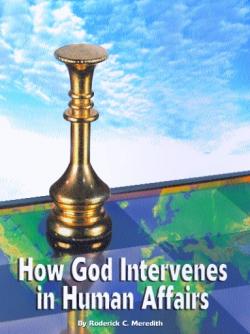Europe: 12 Years After the Wall
When Europe's post-World War II order crumbled in 1989, experts were taken by surprise. But students of the Bible had known all along that Germany would be reunited. What does prophecy say?
Post-Cold War developments that shocked the "experts" were predicted long ago in the pages of your Bible!
For those who watched it unfold, the scene can never be forgotten. Euphoria filled the air as thousands of East Germans poured into West Berlin, dancing and embracing in the shadow of the Berlin Wall. East German guards stood passively by and watched revelers chip off parts of the wall as mementos. Only days earlier, these guards would have shot anyone approaching so close to the wall. Suddenly, it seemed, everything had changed.
Europe's post-World War II order crumbled within a matter of weeks, beginning in September of 1989. The Iron Curtain, which had seemed a permanent fixture to those coming of age in the 1950s and 1960s, was suddenly no more. Even government analysts who had devoted years to studying the European scene were dumbfounded by both the speed and the comprehensive nature of the changes taking place.
Students of the Bible, however, had known all along that Germany would be reunited. Prophecy made this clear, as we will see later in this article. But at the time, even the so-called "experts" were caught by surprise. As U.S. News & World Report magazine wrote at the time: "Now that the dam has burst, no one knows what will stand and what will be swept away. By any measure, the East German government's capitulation to popular dissatisfaction marks a smashing victory for an opposition movement that was as stunned as everyone else by its sudden success. In an unlikely season of grass-roots protest, a peaceful exodus of 200,000 East Germans, accompanied by equally peaceful demonstrations by hundreds of thousands more, brought a Stalinist government to its knees in less than six weeks" (Nov. 20, 1989, p. 20).
East Germans by the tens of thousands poured into West Germany. First they came through neighboring Hungary and Czechoslovakia. Soon the East German government stopped trying to restrict this emigration, and thousands poured through the Brandenburg gate into West Berlin, dancing in the shadow of the hated Berlin Wall. Long a symbol of the Cold War and the East-West divide, the wall itself would soon be gone—as would the East German government itself.
The autumn of 1989 was truly a heady time. Starting in Poland with Lech Walesa's Solidarity movement entering the government in August, Communist governments across Eastern Europe began to fall like dominoes. It appeared that the Cold War was over and the West had won. Events of the last 12 years, however, have shown that the legacy of post-Cold War Europe has been far more complex than most could have foreseen. But what does a changing Europe really portend for Britain, the United States, and the entire world?
Astounding changes in Europe since World War II have brought about a balance of power far different than could have been imagined at the war's end. Like the rest of Germany, post-war Berlin lay devastated and ruined. Russian troops poured in from the east, while American and British troops advanced from the west. Germany's cities and factories were smoldering ruins. Her economy had collapsed, along with her government and her armies.
After the war, Germany was divided into four occupation zones controlled by British, American, French and Russian troops. Within a couple of years, cooperation among the occupying powers was rapidly breaking down. The Russians were busily removing all of the goods and machinery that they could lay their hands on, calling it war reparations. They dismantled virtually everything of value in their occupation zone and transported it to Russia.
Conditions in the zones governed by the western powers were also in disarray. "The currency had fallen to 1/500th of its official value. The commercial system had fallen apart. Farmers and store owners hoarded goods, barter was the order of the day, and cartons of cigarettes and packets of nylon stockings had become the most desirable working currencies" ("The Crisis That Transformed Europe," Dallas Morning News, July 26, 1998).
Corn and Crisis
Sometimes great events are propelled by seemingly insignificant occurrences. So it was that a shipment of corn set in motion a series of events ultimately bringing about today's European currency, the euro.
As 1948 began, the German population was on the brink of starvation. The U.S. government responded by shipping corn, grown in the American Midwest, to hungry Germans. Though corn was a staple in American diets, Germans used it almost exclusively as animal food, prompting Johannes Semler, the German director of economics for the Western powers' occupation zones, to voice in January 1948 a sarcastic comment that the Americans were sending the Germans huhnerfutter—"chicken feed."
General Lucius Clay, the American military governor in Germany, was furious when he learned of Semler's remarks. General Clay summarily fired him and replaced him with a rotund economics professor from Nuremberg, Ludwig Erhard. Professor Erhard was a leader of a movement called the "Ordoliberals," which combined an emphasis on order with belief in a free-market economy.
On June 18, 1948, the Western allies announced Erhard's currency reforms. The worthless reichsmark gave way to a new deutsche mark, but this only solved part of the problem. Economic controls remained, affecting prices and wages and stifling the German economy. Erhard had no authority to make modifications in these controls, but there was no provision that said he could not abolish them. So that is exactly what he did, from one day to the next.
Startled by Erhard's conduct, General Clay asked him for an explanation. "'Herr Erhard,' he sternly said, 'my advisers tell me that what you have done is a terrible mistake. What do you say to that?' 'Herr General, pay no attention to them!' Erhard replied. 'My own advisers tell me the same thing'" (Ibid.). Subsequent history confirms that Erhard was right and the advisers were wrong. This event is considered the launching of Germany's post-war economic miracle.
The Soviets quickly grasped the significance of the Western zones' new currency. Since war's end, the four occupying powers had been negotiating over the future of the German nation. The Western Powers saw that the Soviet Union was foot-dragging and had no intention of allowing a reconstituted Germany in any form acceptable to the West. When the Western Powers unilaterally introduced a new currency, the Soviets correctly understood this as a decision to establish a new political entity within the Western occupation zones. Currency and nationhood always go hand in hand. That was clear to the Soviet Union in 1948, and it ought to be clear to anyone watching the establishment of the euro today.
When the new deutsche mark began to circulate in the Western Powers' zones in Berlin, the Soviet Union decided to strike back—by shutting down the overland routes through East Germany by which the Western Powers had brought supplies into West Berlin. The Soviets anticipated that their bold stroke would force the Western allies to withdraw from Berlin and allow Russian control of the entire city. Their ploy backfired, bringing about one of the most dramatic events of the early Cold War. Immediately after the Soviets announced the blockade, General Clay contacted General Curtis LeMay, commander of the U. S. Air Force in Europe, and together they planned a counter-offensive. By June 26, the Berlin airlift had begun. Between June 26 and September 30, 1949, more than 278,000 airlift flights took place. At one point, a plane was either landing or taking off in West Berlin every 90 seconds, with thousands of tons of supplies brought in daily. The Soviet blockade was effectively broken!
The events surrounding the Berlin airlift served to galvanize the Western Powers to the threat posed by their former ally, the Soviet Union. April 1949 saw the signing of the North Atlantic Treaty, creating NATO. On May 8, the Federal Republic of Germany (West Germany) was launched, combining the three Western military occupation zones.
By the fall of 1949, the post-World War II order seemed to have settled on Europe. It appeared that Germany's division into two nations—one tied to the West and the other dominated by the Soviet Union—was permanent. Not only was Germany divided—so also was the rest of Europe. Two superpowers—the United States and the Soviet Union—seemed to be dividing the entire world into competing spheres of influence, most dramatically shown by what Sir Winston Churchill called the "Iron Curtain" which Russia had draped across Europe.
The Berlin Wall—the most visible symbol of Europe's post-war division—was erected in 1961, 12 years after the end of the Berlin airlift. This massive concrete barrier seemed to give evidence of the permanence and intractability of the East-West divide. With all of this as backdrop, the events of the autumn of 1989, 40 years after the Berlin airlift, appear all the more remarkable. After all of the billions spent on an escalating arms race and the face-off of hundreds of thousands of NATO and Russian-led Warsaw Pact troops across Europe's east-west divide, the Iron Curtain collapsed without a shot being fired. Within weeks, what had previously seemed permanent was simply no more!
Post-Wall Europe
The past 12 years have seen a dramatic reordering of the political, military and economic arrangements in Europe. These changes have not simply affected Europe; they clearly have global implications. A new currency—the euro—was launched on January 1, 1999. The euro was made possible because of the success of a currency that had been introduced 50 years earlier, Germany's deutsche mark. How dramatically things had changed in those intervening years!
Economic unity and political unity are inexorably tied together. The German architects of this system understood that point from the beginning. A common currency, by its very nature, must involve a common economic policy. There must be commonality in everything from labor law to taxation. How can there be unity on these matters without an overriding political structure that can enact and enforce legislation? It simply cannot be done! This has stirred debate in the United Kingdom and the Scandinavian nations. Although some politicians have sought to obscure the point, acceptance of the euro will, by its very nature, involve ceding sovereignty to a supranational government.
Britain's Conservative Party opposition unsuccessfully sought to make an issue of this point last June in the country's general election. The majority of British voters had their minds on other concerns, and had also been beguiled by Prime Minister Tony Blair's promise to allow a referendum on the issue before dumping the pound for the euro.
Despite politicians' occasional denials, the European Union is clearly on the way to becoming far more than a trading bloc or customs union. European Commission President Romano Prodi has urged that more powers be granted to the European Commission. This echoes French Prime Minister Lionel Jospin's call for the harmonization of business taxation across the EU, a European constitution, a European public prosecutor, and a Europe-wide package of social protection for workers. Belgian Prime Minister Guy Verhofstadt has given his backing for a Europe-wide tax system. German Chancellor Schroeder's government has floated ideas for a revamped governing structure for the European Union that would involve the establishment of a federal union for the whole of Europe.
While Britain, Sweden, and Denmark express reluctance to accept the euro in place of their national currencies, the European Union is preparing for expansion eastward. Not only have countries like Poland, Hungary, and the Czech Republic shown great interest, even Russian President Putin has expressed interest in not being left behind. Encouraged by the Germans, Russia is already at the point of adopting the euro as its reserve currency in place of the American dollar. Where is this leading in the months and years immediately ahead?
In the last 12 years, changes in Europe have been profound. Germany is now the most powerful and populous wholly European nation, 80 million strong, right in the heart of Europe. The euro is set to completely replace existing national currencies in Europe—and to challenge the American dollar as the world's chief reserve currency. For the first time since World War II, Germany has deployed troops (peacekeepers in the Balkans) outside her borders. The European Union is implementing a Rapid Deployment Force separate from NATO.
Amid these developments, Europeans are discussing the EU's future governmental structure. What emerges will be vastly different from the Common Market of old. How will laws be made for the European Union—and who will make those laws? National sovereignty is fading and, as many in Britain are beginning to learn to their surprise, regulations made by bureaucrats in Brussels take precedence over laws passed by Parliament.
What the Future Holds
Where is this headed? Incredible as it may seem to some, the answer to that question was recorded thousands of years in advance. The Creator God has revealed history in advance—and it is written in the inspired pages of your own Bible!
The ancient Hebrew prophet Hosea foresaw much that is today happening on the world scene, especially regarding Great Britain. Using the events of his day as a backdrop, Hosea looked centuries into the future to what the Bible calls the "time of the end." Though sometimes referring to the southern kingdom of Judah, Hosea primarily addressed the northern kingdom of Israel where he lived (Israel and Judah had split into two totally separate nations after the death of King Solomon, more than 150 years before Hosea began his ministry). He wrote in the eighth century bc, beginning his prophecies in a time of great material prosperity and peace in northern Israel. Coupled with this prosperity, however, was moral laxity and unfaithfulness to God. Hosea spoke of the impending punishment and Assyrian captivity that was to come upon the northern House of Israel in his day. He also looked far beyond his day to describe the end-time punishment as well as the ultimate deliverance and re-establishment of Israel at the time of the Messiah. The events of Hosea's day foreshadowed end-time circumstances, and his prophecies will have their most complete fulfillment in our day and in the months and years immediately ahead of us.
Hosea 12:1 speaks of Ephraim (the ancient ancestors of the modern British nations) entering into a covenant or treaty with the Assyrians (ancient ancestors of the modern German nation), foreshadowing Britain's current entanglement with the German-dominated European Union. He compared the swift disappearance of Ephraim's glory to a bird flying away (9:11), echoing the British Empire's rapid demise in the days right after World War II. Additionally, Hosea foresaw the massive immigration and resultant racial tensions that would affect Britain (7:8).
God compares modern British leaders to "a silly dove, without sense" in their foolish attempt to look to Germany as a savior (7:11). This is certainly illustrated by the desire of the current British government to replace the pound sterling with the euro and thus to give up sovereignty to a continental European power led by Germany—something resisted by their predecessors twice in the 20th century at great cost of lives and resources.
The real problem, however, goes far beyond economics or politics. Our modern American and British-descended nations have forgotten their Maker (8:14) and rejected the knowledge of God and His ways (4:6). The consequence will be a future national destruction (5:9) and captivity (9:3), followed ultimately by national repentance during the tribulation and by restoration after the return of Jesus Christ as King of kings (3:5; 14:4).
Much has happened in the 12 years since the Iron Curtain crumbled and the Berlin Wall came tumbling down. The stage is now being set in Europe for the most dramatic power shift that can be imagined. Events in Europe during the next few years will usher in the final crisis at the close of this age. But take heart! Jesus Christ tells His true followers to lift up their heads in hopeful expectation when they see these events beginning to happen, because at that time they will have the assurance that their redemption finally is drawing near (Luke 21:28).






